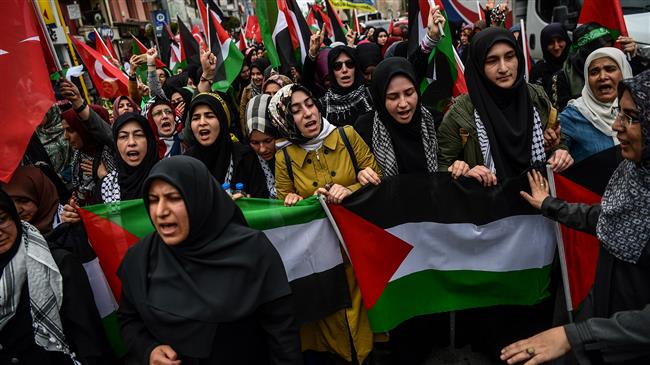Indonesia hit by new deadly explosions after Daesh church bombings
Over a dozen people have been killed in Indonesia’s second city of Surabaya when bombers on motorcycles blew themselves up outside a police headquarters only a day after a string of deadly Daesh terror attacks targeted three churches there.
The explosions took place at a checkpoint outside the building on Monday morning, leaving at least 14 people dead, including four police officers and six civilians.
Police spokesman Frans Barung Mangera explained that “there were four perpetrators riding two motorcycles who have been confirmed dead, their identity is still being verified,” adding, “A child who was with them, an eight-year-old girl... has been taken to the hospital.”
Police Chief Tito Karnavian later told a news conference that the bombers were members of the same family.

Earlier in the day, three people were also killed when a bomb prematurely went off in an apartment in the East Java city of Sidoarjo. Police said those killed were the perpetrators.
The incidents follow a string of horrific deadly attacks, which were carried out by a family of six against three churches a day earlier.
The fatalities from Sunday's attacks, which were claimed by Daesh, reached 14 overnight. More than 40 people were also wounded.
How did the family bomb churches?
Karnavian said the family, which included two girls, aged 9 and 12, and two teenage boys, belonged to a local Daesh-affiliated network, known as Jemaah Ansharut Daulah (JAD).
According to police investigations, the father, identified as the JAD head Dita Oepriarto, dropped off his wife, Puji Kuswat, and two daughters at the he Christian Church of Diponegoro, where the three blew themselves up on Sunday morning.
Citing a security guard, the Associated Press said the woman had arrived at the church carrying two bags, and forced her way inside, ignoring the guards.
“Suddenly, she hugged a civilian, then [the bomb] exploded,” said the eyewitness.
Minutes later, Oepriarto, who was driving an explosives-laden van, arrived into the grounds of Surabaya Centre Pentecostal Church, and detonated the vehicle. The sons also hit another church.

According to the police chief, the family was among hundreds of those that had recently returned from Syria, where the Daesh terror group first emerged in 2014 before losing all the territory it had captured some three years later.
President Joko Widodo, who visited the scene of one of the attacks, said the “cowardly actions” were “very barbaric and beyond the limit of humanity.”
He also ordered police to “look into and break up networks of perpetrators.”
Iran offers sympathy to Indonesia
Iranian Foreign Ministry Spokesman Bahram Qassemi has condemned the brutal terror attacks, offering sympathy to the Indonesian government and nation as well as the families of the victims.

He called further for efforts by regional states and the entire international community to address the root causes of such inhumane acts of violence in the region.
The sole way to prevent such terror attacks, Qassemi added, is for all countries to stand united and take serious measures against terrorism without any double standards.
Indonesia, the world’s most populous Muslim country, has long struggled with domestic terrorist groups, including the al-Qaeda- affiliated group Jemaah Islamiyah, which carried out more than 10 attacks between 2000 and 2010.
It has also been recently confronting Daesh that has been recruiting militants in the country after its collapse in the Middle East.
Last year, two bombers attacked a bus station in the capital, Jakarta, killing at least three police officers. Police suspected Daesh involvement.
In 2016, the local JAD cell, launched several deadly attacks, including one in January that targeted a Starbucks café in Jakarta, killing four people.
That was the first attack claimed by Daesh in Southeast Asia.
Hamas condemns Israeli evacuation order of Indonesian Hospital
VIDEO | Yemen resistance remains resolute
'Easy target': Yemen warns 4th US carrier within reach
Iran military awarded $40 mln worth of vessel building contracts
‘These kids need to be killed’: Shocking details of Israeli brutalities in Gaza
Yemen faces ‘highest burden’ of cholera globally: WHO
Settlement expansion proves Israel cannot be trusted for any peace deal: Hamas
VIDEO | Press TV's news headlines












 This makes it easy to access the Press TV website
This makes it easy to access the Press TV website